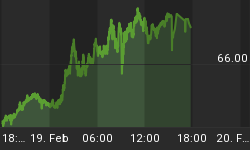08:30 EST, Thurs 9 July
Gold Market "Weak, Overly Long" as Stocks Rally, US Issues Record Government Debt
THE SPOT PRICE OF GOLD eased back ahead of Thursday's New York opening after recovering half of yesterday's 2.1% losses to the US Dollar and Yen.
The price of Gold continued to fall for Euro and UK investors however, flirting with fresh five-month lows as European stock markets rose for the first session in six.
Crude oil held near $61 per barrel after sinking to 7-week lows. Government bond prices ticked lower ahead of a record $11 billion auction of 30-year US debt.
"[Gold] looks very weak at current levels," says a technical note from bullion dealers Scotia Mocatta.
"Silver [also] continues to print lower lows, and lower highs, in this downward trend."
Looking at Asian jewelry markets, the consensus amongst physical dealers is that "poor demand conditions" will persist until late August or early September, says Edel Tully at London dealers Mitsui.
"Summer inertia" has also hit gold-market speculators, Tully writes in a note to clients.
"We believe [the Gold Futures] market remains overly long and further liquidation desires remain in the wings. Until this passes, gold does not have another internal driver to force it northbound."
Official data show the 'net long' position held by hedge funds and other speculative players in US Gold Futures & options shrinking by nearly one fifth from early June's 11-month high.
Equivalent on paper to 529 tonnes of Gold Bullion last week however, it remains one-third greater than the 5-year average.
Yesterday the volume of gold used to back shares in the SPDR Gold Trust - the world's largest Gold ETF - fell by the sharpest amount since April, down 1% to 1,109 tonnes.
"Investor confidence in bullion has taken a back seat and that has been getting reflected in the receding demand," says Pradeep Unni at Richcomm Global Services in Dubai.
"[But] bargain hunting above $900-903 may prevent an aggressive sell-off in the metal. It's most likely that gold could slowly climb back."
A new note from Citigroup analysts meantime forecast that silver will outperform Gold Prices this year, pushing the ratio of Gold Prices to silver down from the current 69 to nearer 55 times.
Over on the forex market on Thursday, the Pound rose sharply, unwinding this week's losses vs. the Dollar and Euro on news of the Bank of England's latest "no change" vote.
Holding its key policy rate at 0.5% and vowing to review its asset-purchase program (a.k.a. Quantitative Easing) next month, the Bank now owns more than 16% of all UK government bonds in issue.
Sterling's jump pushed the Gold Price in British Pounds down to £563 an ounce, just above June's five-month lows.
"One broad measure of the UK money supply, known as M4, has actually fallen 0.4% since the end of February, before the central bank began its quantitative easing," reports the Wall Street Journal.
"I would have hoped to have seen more positive signs by now," the paper quotes UK and European economist Howard Archer at IHS Global Insight in London.
But "So far, QE has been an almost unqualified success," counters monetary economist Tim Congdon in today's Financial Times. If money-supply growth slows further, "the Bank should have no hesitation in expanding its gilt purchases," he believes.
"The priority must be to ensure that the quantity of money continues to rise, so keeping the menace of deflation at bay."
Today the International Monetary Fund (IMF) raised it forecast for world economic decline in 2009, pegging the drop at 1.4% from April's 1.3% forecast.
GDP growth in 2010 will then rebound to 2.5%, the IMF believes, better than April's 1.9% global prediction.
"While the world economy is still in recession," chief IMF economist Olivier Blanchard told a press conference in Washington on Wednesday, "the recovery is coming but it is likely to be a weak recovery."
"We've been advocating stimulate now, consolidate later," said Angel Gurria, secretary general of the Organization for Economic Cooperation and Development (OECD) to Bloomberg today.
"You're not going to remove the stimulus now. It's too early," he said from the G8 summit in L'Aquila, Italy.
The Chinese delegation to this week's meeting of the eight largest developed economies was expected today to raise concerns over Dollar dominance in central-bank reserves.
A new report from the European Central Bank (ECB) in Frankfurt meantime showed the Euro gaining ground as a reserve, trading and speculative currency in 2008, rising to 26.5% of reported central-bank forex reserves and also growing its share of cross-border loans and deposits to more than 22% worldwide.
"People are filled up with debt," says one Tokyo bond salesman at Canadian Imperial Bank of Commerce to Bloomberg.
Commenting on this week's auctions of a record $73 billion in new US government debt, "Given the current yield, I don't believe there will be more purchases of the long bond," he added.
Thirty-year bonds such as the long-dated notes to be auctioned on Thursday have so far cost investors 21% in 2009, Merrill Lynch says, with prices falling and long-term interest rates rising.
Doubling debt issuance to $963bn between Jan. and July, the Obama administration is expected to sell another $1.1 trillion of fresh debt by year-end - more than the entire debt issuance in 2008.
Thursday morning, news spread that bond-fund giant Pimco has pulled out of Washington's $1 trillion Public-Private Investment Program (PPIP), aimed at moving toxic investments from US bank balance-sheets with tax-funded loans and incentives.
















